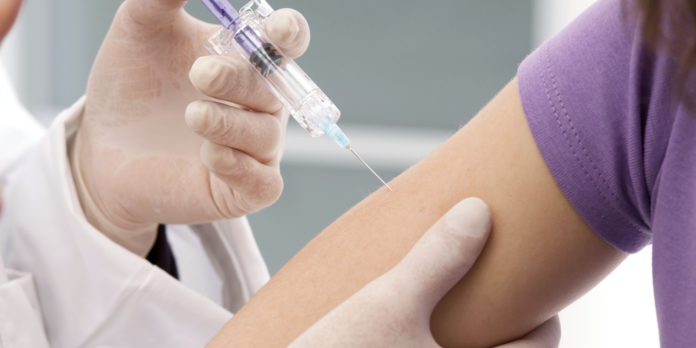
A personalized vaccine to treat patients with ovarian cancer may be a reality in the near future, according to new research by University of Connecticut scientists. The vaccine stems from a new technique that identifies protein mutations in cancer cells, and the method is already set to enter human trials.
The study, co-led by Dr. Pramod Srivastava of the Carole and Ray Neag Comprehensive Cancer Center at the University of Connecticut (UConn) School of Medicine, was published online ahead of print in the Journal of Experimental Medicine.
In order for the immune system to attack cancers, it first has to recognize them. Every cell in the body has a sequence of proteins on its exterior that acts like an ID card or secret handshake, confirming that it’s one of the good guys. These protein sequences, called epitopes, are what the immune system ‘sees’ when it looks at a cell.
Cancerous cells have epitopes, too. Since cancer cells originate from the body itself, their epitopes are very similar to those of healthy cells, and the immune system doesn’t recognize them as bad actors that must be destroyed.
However, just as even the best spy occasionally slips up on the details, cancer cell epitopes have tiny mutations, or mistakes, that differentiate them from healthy cells. If only the immune system knew what to look for, it could identify these distinct mutations as harmful and signal the body to attack those cells, while sparing healthy cells.
“We want to break the immune system’s ignorance,” Dr. Srivastava says. He explains that there could be a thousand or more subtle changes in the cancer cell epitopes, but only 10 have any significance to the immune system.
In their study, the researchers set out identify these significant differences with the aim of enabling the immune system to recognize them.
Vaccine made up of cancer cell epitopes induced cancer resistance in mice
Co-principal investigator and bioinformatics engineer Ion Mandoiu, associate professor of computer science and engineering at UConn, analyzed DNA sequences from the skin tumors of mice and compared them with the DNA sequences from the healthy tissue of the mice.
This process has been conducted in previous studies, but researchers have only looked at the strength of the immune system in binding to epitopes of cancer cells. This works in developing vaccines against viruses, but not for cancers.
Instead, Srivastava’s team came up with a novel measure: they looked at how different the cancer epitopes were from the mice’s normal epitopes. And it worked. When mice were inoculated with vaccines made of the cancer epitopes differing the most from normal tissue, they were very resistant to skin cancer, the researchers found.
“This has the potential to dramatically change how we treat cancer,” says Dr. Srivastava. Theoretically, this approach could also work for other cancers, the team says, although the research has yet to be done.
Testing the vaccine against ovarian cancer in humans
The team plans to test the vaccine in patients with ovarian cancer this fall, once it has been approved by the Food and Drug Administration (FDA). Led by Dr. Angela Kueck, a gynecological oncologist at UConn, the study will involve analyzing the DNA of tumors from 15-20 women with ovarian cancer. The data will then be used to create a vaccine specific to each woman.
Ovarian cancer is the fifth leading cause of cancer deaths among women in the US, affecting an estimated 1 in 73 women during their lifetime and nearly 22,000 women each year. Because symptoms often take a long time to appear, ovarian cancer is often diagnosed at a late stage, resulting in a 5-year survival rate of less than 45 percent.
The typical course of ovarian cancer makes it an ideal candidate for vaccine development, the team explains, because short-term response to treatment is usually good, but in most cases the cancer returns within 1-2 years. This gives the scientists time to develop and administer the vaccine for each woman, and allows them to determine the initial effectiveness of the vaccine within 2 years.
If these vaccines prove to be safe and effective, the researchers say they will move on to a phase 2 clinical trial to investigate whether they prolong the lives of patients with ovarian cancer. Next, they hope to investigate whether the same methods could be used to develop personalized vaccines for other types of cancer.
